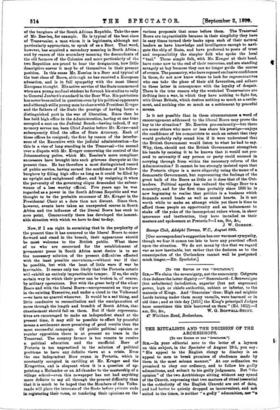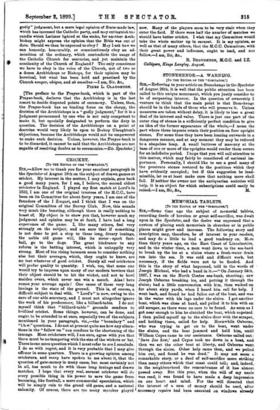THE RITUALISTS AND THE DECISION OF THE ARC RBIS HOPS.
[To TEE EDITOR OF TIER "SPECTATOR"] SIE.—In your editorial note to the letter of a layman on this subject, in the Spectator of August 19th, you say : "His appeal to the English clergy to disobey is an appeal to men to break promises of obedience made by them in the most solemn manner," At our ordination we promised to obey our ordinary, and to follow his godly admonitions, and anbmit to his godly judgments. But `f the opinion" of the two Archbishops sitting without any synod of the Church, expressing that two matters of ritual (essential to the catholicity of the English Church) are out of date, and had better be quietly dropped as inconvenient, and not suited to the times, is neither "a godly admonition, nor "a
godly" judgment, bat a were legal opinion of State-made law, which has incensed the Catholic party, and may extinguish the candle which Latimer lighted at the stake, for another Arch- bishop might express the opinion that the Bible was out of date. Should we then be expected to obey ? May I ask how we can honestly, honourably, or conscientiously obey an ad- monition of the ordinary, which contradicts the usage of the Catholic Church for centuries, and yet maintain the continuity of the Church of England ? The only conscience we have to obey is the voice of the Church, not of two or a dozen Archbishops or Bishops, for their opinion may be heretical, but what has been held and practised by the Church temper, ubique, and ab omnibus —I am, Sir, dtc., BIERS L. °LAUGHTON, [The preface to the Prayer-book, which is part of the Prayer-book, declares that the Archbishop is in the last resort to decide disputed points of ceremony. Unless, then, the Prayer-book has no binding force on the clergy, the decision of the Archbishops is a "godly judgment," for it is a judgment pronounced by one who is not only competent to make it, but specially designated to perform the duty in question. The decision of the Archbishops on a point ot doctrine would very likely be open to Bishop Claughton's objections, because the Archbishops would not be empowered to make such decision. Unless, however, the Prayer-book is to be discarded, it cannot be said that the Archbishops are not capable of resolving doubts as to ceremonies.—En. Spectator.]



































 Previous page
Previous page